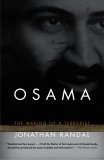Summary | Excerpt | Reviews | Readalikes | Genres & Themes | Author Bio

Critics' Opinion:
Readers' Opinion:
First Published:
Aug 2004, 352 pages
Paperback:
Sep 2005, 368 pages
 Book Reviewed by:
Book Reviewed by:
BookBrowse Review Team
Buy This Book
In advertised as well as secret meetings, American emissaries constantly
reminded Taliban representatives in no uncertain terms that time was running
out, that Osama's next terrorist operation would at long last mean war. Such
foreign warnings appeared to have a perverse effect on Mullah Omar. Already back
in 1998, soon after the truck-bomb attacks on American embassies in Nairobi and
Dar es Salaam that August, he had jeopardized official Saudi financing when the
Kingdom's intelligence chief, Prince Turki al-Faisal, showed up in Kandahar
mistakenly convinced Omar would honor an earlier pledge to hand Osama over.
Throughout 2001, telltale signs chronicled Osama's growing ascendancy over
Mullah Omar. Osama openly defied the formal Taliban prohibition on his public
pronouncements, staged an ostentatious wedding for a son and privately
encouraged the destruction of the two giant Buddhas in Bamian and other
pre-Islamic art, in keeping with the idol-smashing convictions of the
puritanical Saudi Islamic faith of his upbringing.[2] But for all his careful
cultivation of Mullah Omar, little if anything suggests Osama bothered to inform
his host of his plans for September 11, which were a good two years in the
making. To have so taken any of the Taliban into his confidence would only have
encouraged dissension among those Afghan leaders who increasingly feared that
Omar was allowing Osama to compromise their destiny. For years, for all the
public show of solidarity with Osama--and their unconvincing claims to have him
under their thumbs--Taliban leaders had argued privately among themselves about
the obvious dangers of harboring a guest so patently determined to march to his
own drummer. Those long-muffled dissensions were confirmed once the Taliban
regime was dismantled in November 2001.
Long before, even the dimmest Afghan had an inkling of what was going on in
dozens of Al-Qaeda training sites scattered around Kabul, Kandahar, Jalalabad
and rural locations, many of them built into the Hindu Kush during the war
against the Soviet Union. After all, some camps simultaneously housed Al-Qaeda
terrorist trainees, Taliban conscripts and cannon fodder for Pakistan's
irredentist campaign in Kashmir to weaken archenemy India. The more hardheaded
Taliban thought of their self-styled Islamic emirate as a state, while
recognizing that the United Nations and various nongovernmental humanitarian
organizations provided what passed for the few government services on offer to
the population. Osama indulged Mullah Omar's hankering for renewing the
caliphate to run the Sunni Muslim world that Ataturk had abolished in 1924 soon
after establishing the Turkish Republic. In fact, Osama was more interested in
the process of getting there--jihad and his radical methodology of spreading
holy war--than in the mundane business of running a government. And so Mullah
Omar and the Taliban were expendable.
It soon became an article of faith for Americans that September 11 utterly
changed their lives. Beauty, or in this case horror, was in the eye of the
beholder. One of Americans' great strengths is their ability to live in the
present and think in the future to such an extent that it is difficult to
predict what enduring scars 9/11 will leave on the American psyche. Who before
September 11 could have predicted that the Bush administration would abandon its
inward-looking election platform and embark on a policy seemingly determined to
reorder the Middle East, an undertaking that had brought woe to so many previous
world powers? But more mundanely, what demonstrably changed was the modus
operandi of terrorism; in that, 9/11 marked a radical departure.
Notes
Excerpted from Osama by Jonathan Randal Copyright© 2004 by Jonathan Randal. Excerpted by permission of Knopf, a division of Random House, Inc. All rights reserved. No part of this excerpt may be reproduced or reprinted without permission in writing from the publisher.





The House on Biscayne Bay
by Chanel Cleeton
As death stalks a gothic mansion in Miami, the lives of two women intertwine as the past and present collide.

The Flower Sisters
by Michelle Collins Anderson
From the new Fannie Flagg of the Ozarks, a richly-woven story of family, forgiveness, and reinvention.

The Funeral Cryer by Wenyan Lu
Debut novelist Wenyan Lu brings us this witty yet profound story about one woman's midlife reawakening in contemporary rural China.
Your guide toexceptional books
BookBrowse seeks out and recommends the best in contemporary fiction and nonfiction—books that not only engage and entertain but also deepen our understanding of ourselves and the world around us.